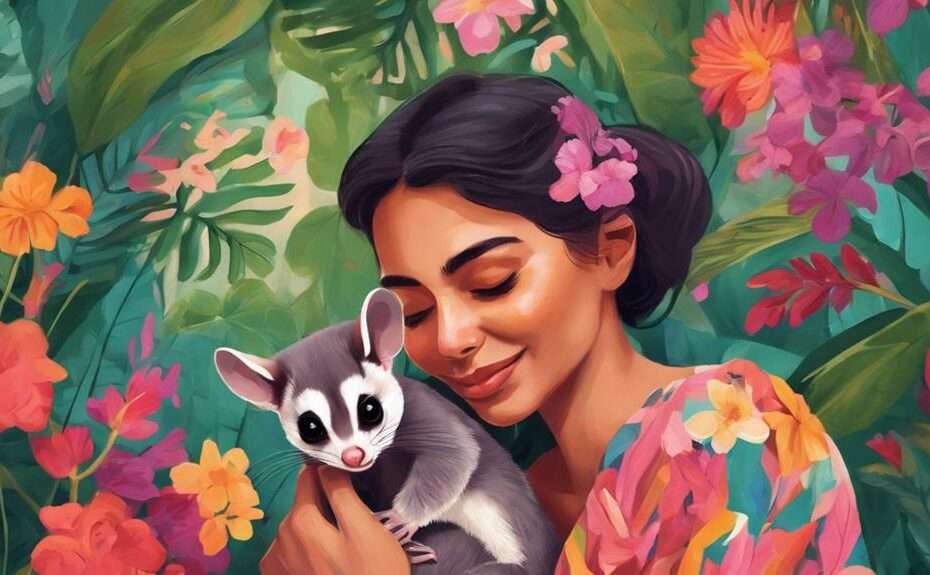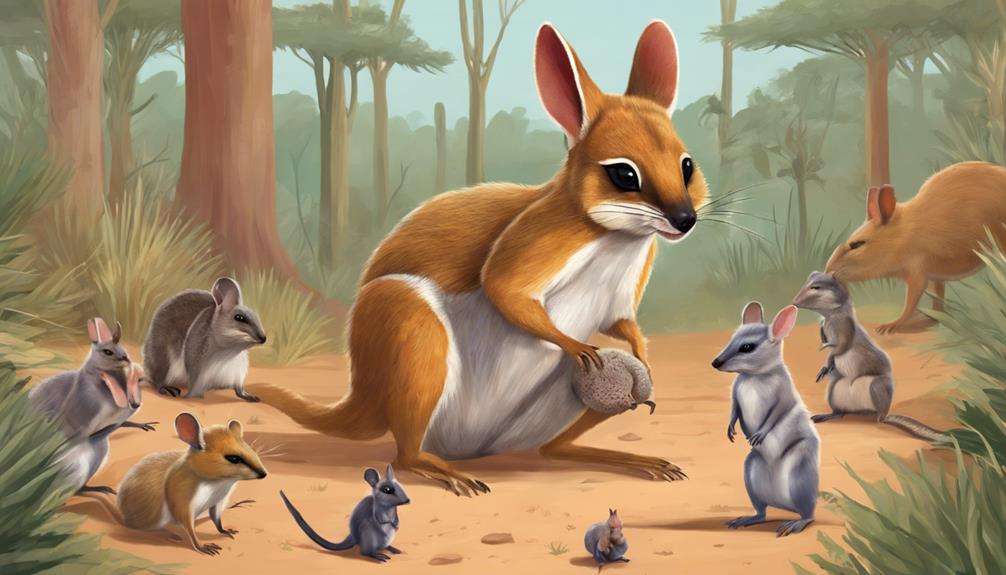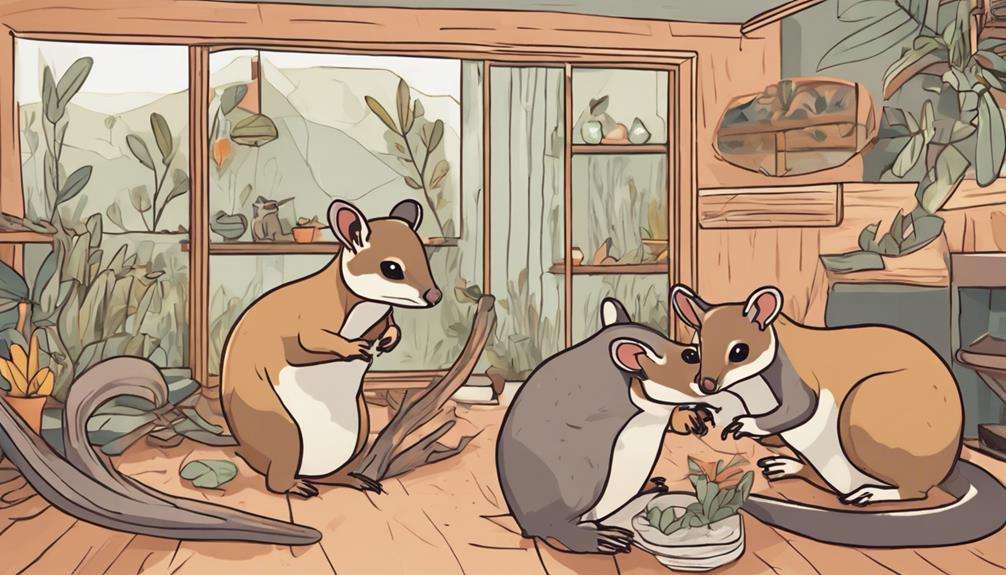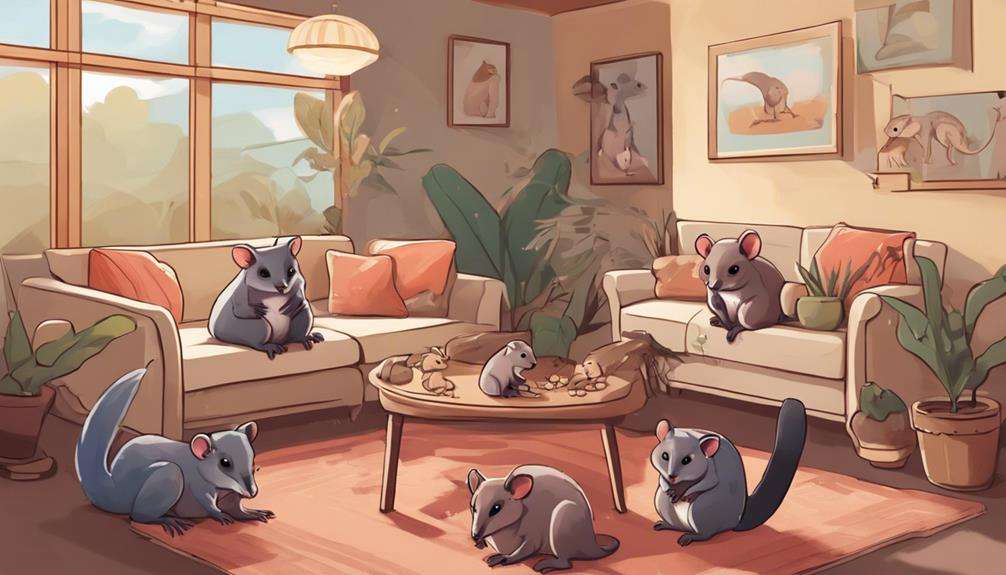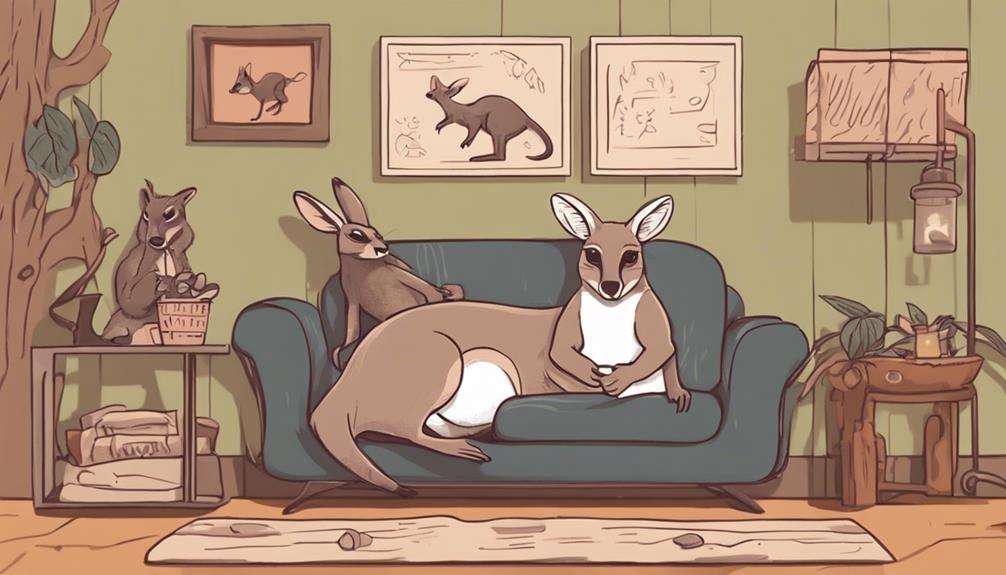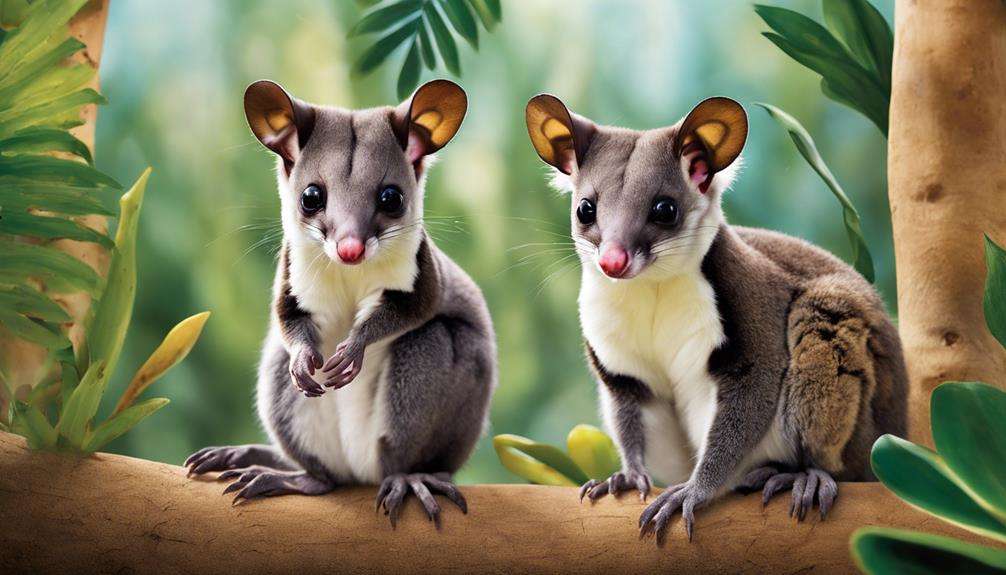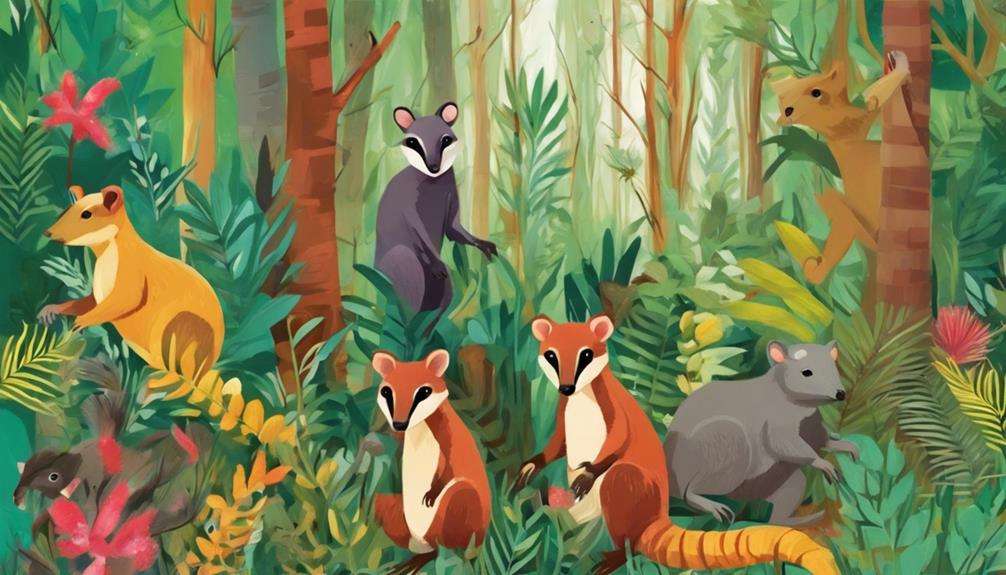Thinking about adding a unique companion to your household? Discover the world of exotic marsupials as potential pets that might just steal your heart with their charm and distinctive behaviors.
But before you take the leap into this unconventional pet ownership, there are crucial considerations to ponder. From their specialized diets to the legal aspects of having these captivating creatures as companions, there's much to explore in the realm of exotic marsupials.
Curious to unravel more about these extraordinary animals and what it takes to care for them?
Key Takeaways
- Sugar gliders captivate with their social nature and unique care requirements.
- Conservation efforts are vital for protecting exotic marsupials like sugar gliders.
- Enriching environments enhance sugar gliders' well-being and natural behaviors.
- Understanding sugar gliders' nutritional needs and communication cues is key to bonding.
Unique Marsupials to Consider
When considering unique marsupials as potential pets, one can't overlook the captivating charm and distinct characteristics of sugar gliders. These small, omnivorous marsupials native to Australia and Indonesia are known for their ability to glide through the air using skin flaps. Their grey or brown fur color, coupled with a dark stripe down their back and limbs, makes them easily recognizable. Referred to as sugar bears, honey gliders, and sugar squirrels, sugar gliders are popular among exotic pet enthusiasts and are categorized as 'pocket pets' due to their size and endearing characteristics.
Originating from the land down under, sugar gliders have captured the hearts of many with their unique gliding abilities and adorable appearance. Their natural acrobatic skills and social nature make them intriguing companions for those willing to provide the specialized care they require. As exotic pets, sugar gliders offer a fascinating glimpse into the world of marsupials, bringing a touch of Australia's wildlife into the homes of dedicated pet owners.
Quirky Marsupial Behavior and Care
Sugar gliders exhibit fascinating nocturnal behavior, with their peak activity occurring during the night.
Ensuring they have companionship is vital as these social creatures thrive in groups, preventing loneliness.
Proper diet, spacious cage setups, and mental stimulation are key elements in caring for these unique marsupials.
Unique Marsupial Habits
In the realm of marsupials, the nocturnal nature of sugar gliders sets them apart with their active nighttime habits and daytime rest to evade predators. These unique marsupials exhibit fascinating behaviors that contribute to their survival and social interactions:
- Social Grooming: Sugar gliders engage in social grooming to strengthen bonds within the colony and maintain hygiene.
- Breeding Season: Breeding in sugar gliders is seasonal, with young typically born in winter and spring for optimal survival.
- Communication Methods: Communication among sugar gliders involves a variety of methods, including vocalizations, visual signals, and chemical odors.
These habits, along with their body temperature regulation through huddling, showcase the intricate and captivating nature of sugar gliders in the wild.
Proper Care Essentials
To ensure the well-being of your sugar gliders, it's imperative to understand and cater to their unique needs and behaviors. Sugar gliders, as exotic animals, require social interaction as they're highly social creatures that thrive in groups. Providing at least two companions is essential for their well-being.
These delicate creatures are prone to injuries, emphasizing the need for supervision, especially around children. Creating a suitable habitat for your sugar gliders is crucial, which includes a spacious cage, safe toys, and supervised time outside the enclosure.
Additionally, legal considerations must be taken into account, as ownership regulations vary by state, with some requiring permits and the purchase from reputable breeders. By addressing these factors, you can ensure a fulfilling and healthy life for your sugar gliders.
Legalities of Owning Exotic Marsupials
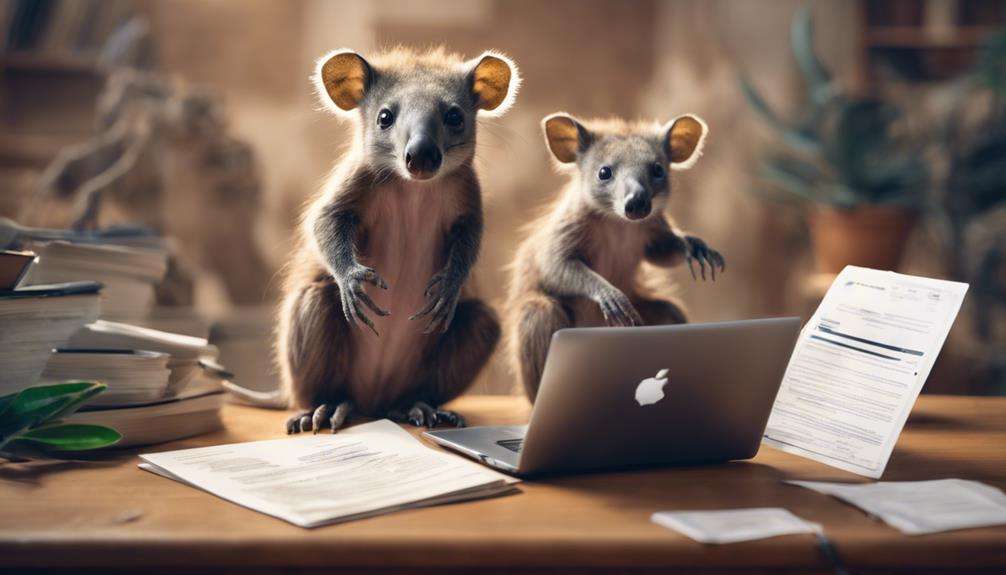
When considering the legalities of owning exotic marsupials, it's imperative to understand the specific regulations and protections in place for these unique animals.
- Habitat Loss: Marsupials, like quokkas, are facing threats such as habitat loss, which puts their survival at risk.
- Native Range: These animals have a restricted native range, making it crucial to preserve their natural habitats.
- Protected Status: Many exotic marsupials are protected by laws due to their vulnerable status, making it illegal to disturb or own them without proper authorization.
It is essential to respect these regulations to ensure the conservation of these species in the wild.
For instance, quokkas are legally protected in Australia, and violating laws can result in severe fines. Keeping these animals as pets is discouraged not only because of legal reasons but also because of their wild nature and social needs.
Exotic Diets for Unusual Marsupials
When caring for unusual marsupials as pets, it's crucial to understand their unique dietary needs and provide them with special feeding requirements to ensure their health and well-being.
These exotic animals may require a diet that replicates their natural food sources, such as manna or Banksia pollen, to meet their nutritional requirements.
Guidelines and studies on feeding behavior and nutrition assist in developing appropriate diets to maintain the optimal health of exotic marsupials like sugar gliders in captivity.
Unique Dietary Needs
Exotic marsupials with unique dietary needs often require specialized nutrition plans to ensure their health and well-being in captivity. When caring for sugar gliders, it's crucial to provide a balanced diet that meets their specific nutritional requirements. Here are some essential points to consider:
- Varied Diet: Sugar gliders need a diverse range of fresh fruits, vegetables, and protein sources to thrive.
- Nutritional Guidelines: Following established guidelines and providing sample diets can help ensure the sugar gliders receive essential nutrients and vitamins.
- Veterinary Care: Proper veterinary care is essential for sugar gliders, including unique procedures like orchiectomy and scrotal ablation for males, emphasizing the need for specialized attention.
Understanding and meeting the dietary needs of these exotic pets is vital for their overall health and happiness.
Special Feeding Requirements
To ensure the optimal health and well-being of sugar gliders with unique dietary needs, it's crucial to carefully design specialized nutrition plans that cater to their specific requirements. Sugar gliders require a diet rich in protein, which should consist of insects, nectar, pollen, and fruits.
Additionally, these marsupials have specific dietary needs for calcium and phosphorus to maintain their bone health. Failure to meet these requirements can lead to health issues such as obesity and metabolic bone disease. In captivity, providing vitamin supplements may be necessary to ensure they receive all essential nutrients.
Owners should aim to offer a varied and balanced diet to replicate the diverse nutrition sugar gliders would typically obtain in the wild.
Bonding With Rare Marsupial Species
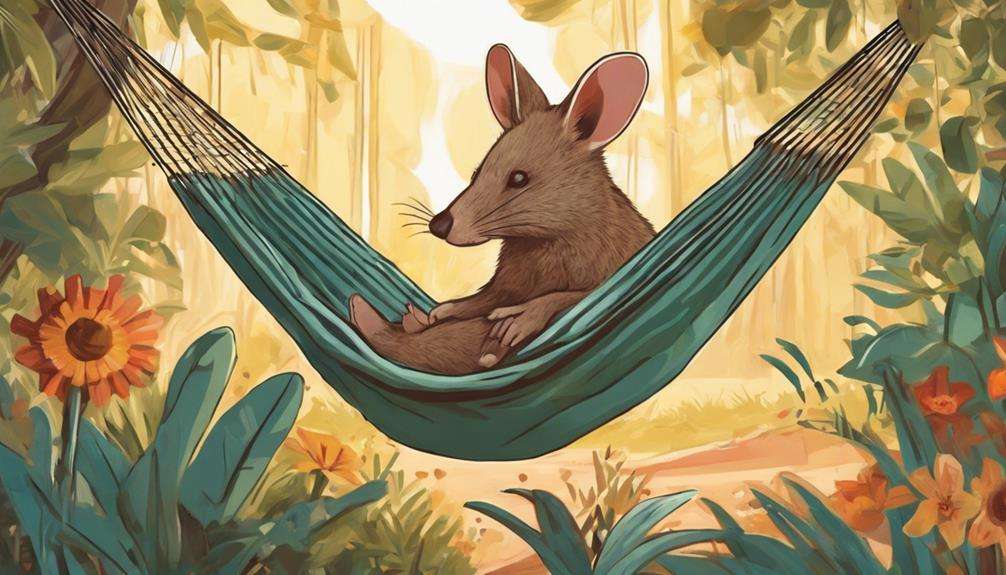
Regular interaction and handling are vital for establishing trust and companionship with rare marsupial species like sugar gliders. Socialization plays a crucial role in the bonding process, as these exotic marsupials thrive in groups and benefit greatly from having at least one companion to interact with regularly.
Understanding their unique communication methods, such as vocalizations and scent marking, is essential for developing a strong bond with these rare marsupials.
To enhance your bonding experience with rare marsupials, consider the following tips:
- Provide a Safe Environment: Creating a safe and stimulating environment for your pet will help strengthen the bond between you and your rare marsupial.
- Consistent Care and Attention: Offering consistent care, attention, and respect for the natural behaviors of these exotic marsupials are key to building a lasting bond.
- Learn Their Communication Cues: Take the time to learn and understand the various ways in which these marsupials communicate, as it will deepen your connection with them.
Enriching Environments for Exotic Marsupials
Creating an enriching environment for exotic marsupials involves providing ample space for climbing and exploring, incorporating hiding spots and nesting materials, offering a variety of toys for mental stimulation, and ensuring access to fresh branches for dental health. Exotic marsupials, like sugar gliders or quokkas, thrive in environments that mimic their natural habitats.
To fulfill their climbing instincts, consider installing branches, ropes, or ladders in their enclosure. Including hiding spots such as small caves or tunnels can offer a sense of security and privacy. Nesting materials like shredded paper or leaves can encourage natural behaviors and provide comfort.
Introducing toys like puzzle feeders, chew toys, or foraging balls can keep them mentally engaged and prevent boredom. Remember to regularly rotate toys to maintain their interest. Access to fresh branches for chewing not only aids in dental health but also provides a source of enrichment.
Health and Wellness Tips for Uncommon Marsupial Pets
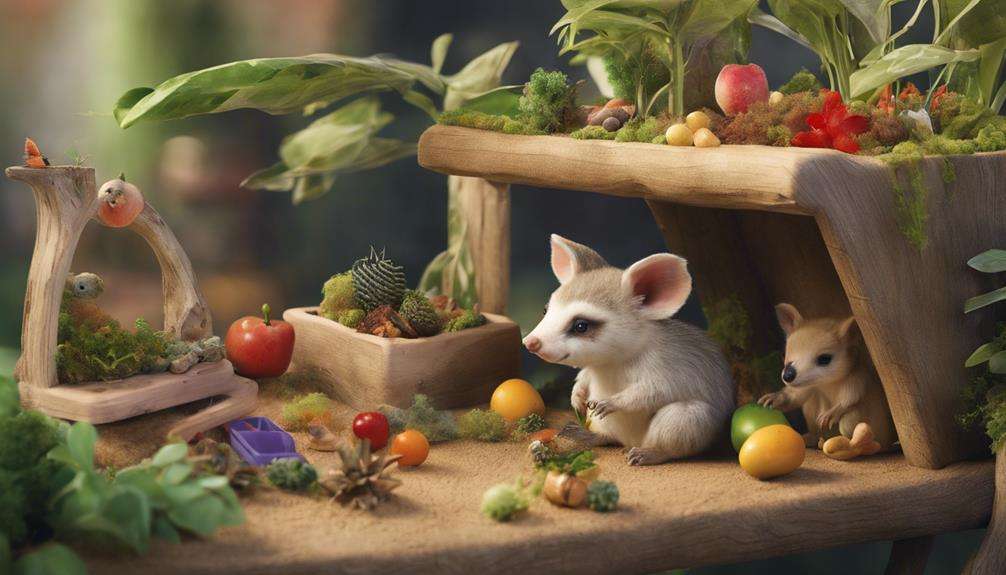
How can you ensure the optimal health and wellness of your uncommon marsupial pet?
Regular veterinary check-ups are crucial to monitor their health and detect any issues early. Providing a balanced diet specific to the species' nutritional needs is essential for overall well-being. Creating a safe and enriched environment with proper temperature, humidity, and hiding spots promotes mental and physical health.
- Regular Veterinary Check-ups:
Schedule routine check-ups with a veterinarian experienced in exotic marsupials to ensure your pet's health is monitored and any potential issues are addressed promptly.
- Balanced Diet:
Offer a diet that meets the specific nutritional requirements of your marsupial pet, providing a mix of proteins, fruits, vegetables, and supplements as needed to support their well-being.
- Safe Environment:
Create an environment that mimics their natural habitat, with appropriate temperature, humidity levels, and hiding spots to keep your pet comfortable and stress-free.
Frequently Asked Questions
What Is the Rarest Exotic Pet?
The rarest exotic pet, the Leadbeater's Possum, is a unique companion due to habitat loss. Conservation efforts are vital in protecting these elusive species. Enjoy exotic companionship with rare marsupials like the Bilby and Numbat, uncommon pets worth preserving.
What Animal Is a Sugar Baby?
A sugar baby, also known as a sugar glider or Petaurus breviceps, is a tiny marsupial that belongs to the glider possums. These pocket pets are adorable creatures with skin flaps for gliding.
Can I Legally Own a Quokka?
You cannot legally own a quokka due to strict legal restrictions protecting them. Their wild nature and threatened status make them unsuitable as pets. Their specialized diet and habitat requirements further discourage domestication attempts.
What Is the Best Marsupial Pet?
When considering the best marsupial pet, factors such as wallaby care, kangaroo behavior, possum training, koala diet, and wombat enrichment play crucial roles. Understanding these aspects is vital in providing proper care and ensuring the well-being of these unique animals.
Conclusion
You have now learned about the unique world of exotic marsupials as pets, from their physical characteristics to their dietary preferences.
Remember, owning these creatures comes with legal considerations and requires specialized care.
Are you ready to take on the challenge of providing a nurturing environment for these captivating and rare animals, or will you continue to admire them from afar?
The decision is yours to make.
